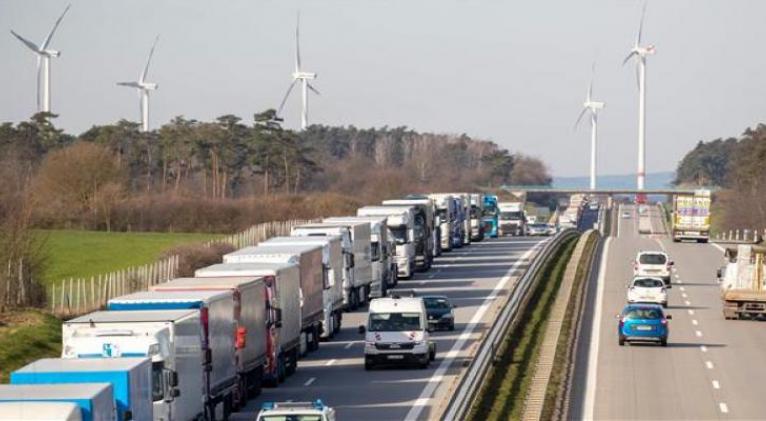EU decides to fully close borders to contain coronavirus outbreak
especiales

Brussels, March 18 (RHC)-- The European Commission has announced plans to enact the full closure of borders across the 27-member European Union as part of efforts to contain the now-global coronavirus pandemic in Europe.
Ursula von der Leyen, the president of the EU’s executive arm, said she would ask European leaders to impose full border restrictions and ban all non-essential travel throughout Europe’s Schengen free-travel zone in order to curb the spread of the deadly virus.
The European Commission chief added that long-term residents, family members of EU nationals, and diplomats as well as cross-border and healthcare workers would be exempt. “The less travel, the more we can contain the virus,” von der Leyen said in a video message, stressing that the measures would be in place for at least 30 days.
The Schengen agreement allows the freedom of movement between almost all EU member states without any border control. Over the past week, individual European countries have fully or partially sealed their borders to non-nationals and implemented extra border checks over the pandemic.
Von der Leyen made the comments ahead of a video-summit with EU leaders hosted by European Council chief, Charles Michel, in Brussels on Tuesday. France had already on Monday suspended all trips between European and non-European countries. The country went into lockdown to contain the virus spread as the death toll in neighboring Italy jumped to above 2,000.
French Finance Minister Bruno Le Maire on Tuesday unveiled a 50-billion-dollar (45-billion-euro) aid package to help businesses and employees affected by the crisis. “We are going to mobilize 45 billion euros as our first immediate economic assistance to companies,” Le Maire told French RTL radio. “We don’t want bankruptcies.”
Warning that the country faced recession this year, the French finance minister said the government was also prepared to use all means to support big companies suffering in financial market turmoil due to the virus spread.
Elsewhere in Europe, German Chancellor Angela Merkel said on Tuesday that her country would undertake extraordinary measures by banning large gatherings nationwide, and advised people to cancel any domestic or foreign holiday travel.
Media reports said public venues, including bars, leisure facilities, zoos, and playgrounds were closed, and restaurants would have to enforce a minimum distance between tables and work under restricted hours. German schools had already been closed across the country.
“These are measures that have never been seen before in our country,” Merkel said at a news conference in Berlin. “But they are necessary to reduce the number of illnesses and serious diseases and not to overburden our health system. The better everyone sticks to these rules, the faster we’ll get through this phase.”
The German chancellor also announced that the EU would impose an entry ban on travelers from outside the bloc for 30 days to battle the spread of the coronavirus.
Merkel said the member states "agreed to impose an entry ban" in the bloc, adding, "That should apply for 30 days. Germany will implement it immediately." Merkel also vowed that the government would make every effort to minimize the economic impact of the outbreak in the European country. Germany has so far reported close to 7,000 confirmed cases of coronavirus infection, with 14 fatalities.
Meanwhile, German media reported on Tuesday that a possible successor to the 65-year-old chancellor had contracted the new coronavirus and was now under quarantine. Friedrich Merz, one of the frontrunners to lead Merkel’s center-right Christian Democratic Union (CDU), was reported by German magazine Der Spiegel to have tested positive for the virus.
“A corona test I performed on Sunday is positive. I will be under quarantine at home by the end of next week,” Merz was quoted by Der Spiegel as saying. “Fortunately, I have only mild to moderate symptoms. All appointments have been cancelled. I will strictly follow the instructions of the health department.”
Merz emerged as one of the three promising candidates to lead the CDU after Merkel’s preferred successor, former minister of defense Annegret Kramp-Karrenbauer, resigned late last month.
The EU has been ramping up its efforts to coordinate the fight against the virus across all its 27 member states as the World Health Organization (WHO) warned on Friday that Europe was now the “epicenter” of the global coronavirus pandemic and was reporting more daily cases than China did at the height of its outbreak.
Edited by Ed Newman














Add new comment